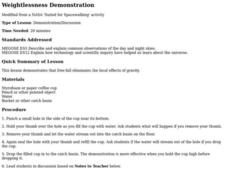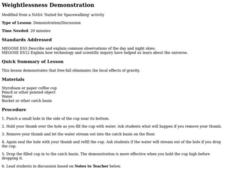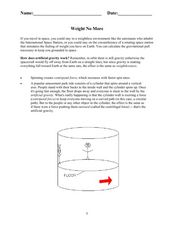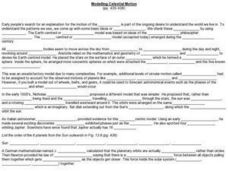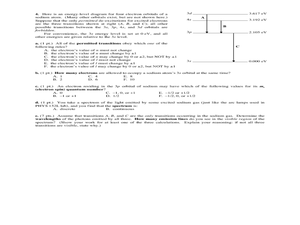Curated OER
The Solar System and Beyond
What an inspiring PowerPoint! The color scheme and pictures all contribute to the scientific style of this PowerPoint and will keep the attention of your junior high kids. The diagrams help illustrate the positioning of the moon, sun and...
Curated OER
Unit VIII: Worksheet 3 - Central Force
Beginning physicists imagine being aerospace engineers by solving seven centripetal force problems. They calculate the work, speed, time, and acceleration of objects in orbit: a satellite around Earth, and Earth around the sun. This is a...
Curated OER
Modeling the Solar System
Students build a scaled model of the solar system. In this space science lesson, students arrange them according to their distances from the sun. They analyze each planet's unique features such as density and relative gravity.
Curated OER
Atomic Theory
An extremely thorough presentation walks new chemists through the basics of matter. There really isn't a unifying theme, however So many topics are covered: forces, elements, atomic structure, chemical properties, compounds, quarks,...
Curated OER
Lesson-Mass and Weight
Student identify the three stationary positions, on the Earth, on the Moon, and in a house floating atop the cloud layers of Jupiter. They also identify the three orbiting positions, orbiting the Earth, orbiting the Moon, and orbiting...
Curated OER
Weightlessness Demonstration
Young scholars explore the concept that free-fall eliminates the local effects of gravity. They discuss what an Earth-orbiting spacecraft experience is like as well as the terminology of weightlessness. Their lab experiment commences.
Curated OER
Weightlessness Demonstration
Students investigate gravity. In this weightless lesson students complete a lab activity about how a free fall might effect how one perceives gravity.
Curated OER
How Can a Spacecraft Always Face the Sun?
Students determine the correct orbital path for a satellite that collects data about the sun so that its view of the sun never be obstructed by the Earth.
Curated OER
Weight No More
Students relate the concept of gravity to math. In this algebra lesson plan, students define scientific terminology relative to gravity, weight and centripetal force. They measure the different dimensions of a cylinder as they discuss...
Curated OER
NUMB3RS Activity: Implicit Orbits
In this algebra worksheet, students solve word problems using algebraic equations and implicit differentiation. There are 16 problems dealing implicit differentiation.
Curated OER
Modeling Celestial Motion
In this modeling celestial motion instructional activity, students fill in the blank about the motion of celestial bodies: planets and stars. Students complete the blanks with information about the scientists and philosophers responsible...
Curated OER
Gravity
Sixth graders explore the characteristics of gravity. They discuss gravity on Earth and then use cereal boxes to research and compare the weight of objects on Earth to the weight of those objects on other planets.
CK-12 Foundation
Newton's Cannon
Gravity does more than keep our feet on the ground — it holds a satellite in orbit, too. Help learners understand the effects of gravity on an orbiting object through a simulation activity. Individuals adjust a launch speed and watch as...
Curated OER
Physics 152 Fall 2004 Final Exam, Parts A, B, C, D
At the end of a general physics course focused on light and electricity, you can administer this exam. Concepts covered include electromagnetism, circuits, induction, light rays, lenses and mirrors, characteristics of light, electron...
Curated OER
Plasmasphere
In this plasmasphere worksheet, students determine how long the plasmasphere takes to rotate around the Earth using two satellite images taken three hours apart.
Curated OER
Motion Near Earth
In this motion worksheet, students will match 5 physics vocabulary words relating to motion with their definitions. Then, they will review 9 statements of different motion scenarios to determine is the statement is true or false....
Curated OER
Our Solar System
In this solar system worksheet, students read about the planets, asteroids, meteoroids, comets, and the moon. Then students complete 25 multiple choice, 4 true or false, and 3 short answer questions.
Curated OER
Weightlessness
Students use a coffee cup to demonstrate weightlessness. After a lecture/demo, students read an article on free-fall. They perform a simple experiment which helps them explain the concept of weightlessness.
Curated OER
Life in Space: International Space Station
Students explore the potential challenges of living in space. In this investigative lesson students search the Internet to locate 16 nations that are working together to build the Independent Space Station, then they divide into groups...
Curated OER
The Solar System
Students describe the different bodies that make up our solar system, explain the place of our solar system within the Milky Way Galaxy and the universe, explain day and night and the Earth's movement, and describe the relationship...
Curated OER
Let's Think About Day and Night
Students explore day and night and the relationships between the Earth, the sun and the moon. They discuss the ways in which the sun and moon help us. They watch a short video that helps illustrate these concepts.
Workforce Solutions
A Colony for Lunar Living
Two lessons explore the possibility of living on the moon. First, scholars read various scenarios to identify which careers would best transfer to life in space. Finally, pupils examine a website to locate items made for outer space,...
LABScI
Viscosity: The Fluid Lab
There's more to fluids than meet the eye—they include gases, liquids, and polymers, too! Scholars complete three hands-on activities exploring different properties of fluids. They explore viscosity by measuring the resistance, or...
Curated OER
Our Solar System
In this solar system worksheet, students complete a database comparing the 9 different planets' mass, surface temperature, rotation period, orbital period, moons, and distinguishing features. This worksheet is a graphic organizer.







